May 9, 2025
Air Date: May 9, 2025
FULL SHOW
SEGMENTS
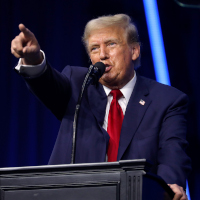
Trump Sues States Over Climate Action
View the page for this story
At the direction of President Donald Trump the U.S. Department of Justice has sued four states -- Vermont, New York, Hawaii, and Michigan -- that are trying to recover some climate costs from major fossil fuel companies through climate superfund laws and litigation. Vermont Law and Graduate School Emeritus Professor Pat Parenteau joins Host Aynsley O’Neill to explain why he views the DOJ cases as frivolous extensions of the other actions the Trump administration has taken to aid the fossil fuel industry. (11:17)
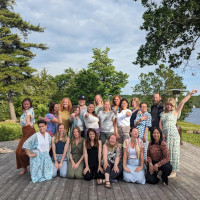
Climate Wayfinding with Katharine Wilkinson
View the page for this story
A project called Climate Wayfinding aims to tend to the deepest needs of climate activists by providing a space for reflection, connection, and clarity amid the chaos. Climate Wayfinding has its roots in the All We Can Save project, co-founded by Dr. Katharine Wilkinson, who joins Host Jenni Doering to share her own story of moving from feeling lost to gaining clarity about her role in the climate movement. (16:57)
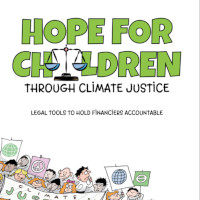
Faith in a Better Climate Future
View the page for this story
The children of today and tomorrow are not to blame for the climate crisis and yet are likely to suffer it the most. In hopes of remedying this injustice the World Council of Churches has published “Hope for Children Through Climate Justice,” a handbook for communities of faith looking to hold financial actors accountable for their fossil fuel investments. Frederique Seidel is their senior program lead on children and climate and she spoke with Host Jenni Doering. (13:06)
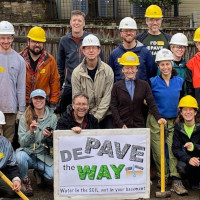
"Depaving" the Way to Greener Neighborhoods
/ Sophia PandelidisView the page for this story
"Depaving parties" of volunteers with sledgehammers are turning paved yards into pollinator havens and green space. That can help reduce climate impacts from extreme heat and flooding. Living on Earth’s Sophia Pandelidis reports from Somerville, Massachusetts. (05:06)
Show Credits and Funders
Show Transcript
250509 Transcript
HOSTS: Jenni Doering, Aynsley O’Neill
GUESTS: Pat Parenteau, Frédérique Seidel, Katharine Wilkinson
REPORTERS: Sophia Pandelidis
[THEME]
DOERING: From PRX – this is Living on Earth.
[THEME]
DOERING: I’m Jenni Doering.
O’NEILL: And I’m Aynsley O’Neill.
The Trump DOJ is suing states that are trying to “make polluters pay” for climate damage.
PARENTEAU: These cases have no merit. They're purely intimidation tactics. The president is directing them to attack states that he believes are interfering with his plans to make America dominant in fossil fuels.
DOERING: Also, “depaving parties” aim to transform paved yards into pollinator havens.
MEUNIER: Ideally, when you can get pavement out, it increases not just more space for water to go, but it increases opportunities for planting gardens, for planting trees, for yards for kids to run around and play, park space, etc. It’s like, amazing.
DOERING: We’ll have those stories and more, this week on Living on Earth. Stick around!
[NEWSBREAK MUSIC: Boards Of Canada “Zoetrope” from “In A Beautiful Place Out In The Country” (Warp Records 2000)]
[THEME]
Trump Sues States Over Climate Action
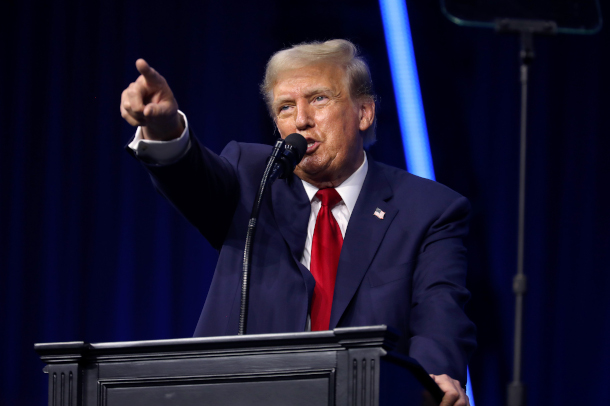
On his 2024 campaign trail, President Trump pledged to push back against state climate efforts. However, legal experts noted that his decision to preemptively strike against lawsuits that had yet to be filed was an unusual move. (Photo: Gage Skidmore, Flickr, CC BY-SA 2.0)
DOERING: From PRX and the Jennifer and Ted Stanley Studios at the University of Massachusetts, Boston, this is Living on Earth. I’m Jenni Doering.
O’NEILL: And I’m Aynsley O’Neill.
The U.S. Department of Justice is suing four states to prevent them from holding fossil fuel giants accountable. New York and Vermont have already passed Climate Superfund laws, based on a “polluter pays” model that requires fossil fuel companies to pay their fair share of the huge costs of fixing and preventing climate damage. These laws have become the focus of lawsuits from fellow states, fossil fuel industry groups, and now, the Trump administration. Meanwhile, the Trump DOJ also preemptively sued Hawai’i and Michigan for their separate planned litigation against oil companies. These cases have all been filed in the U.S. court system, but the potential ramifications could reverberate around the globe. For more on this, we turn now to Pat Parenteau, Emeritus Professor at Vermont Law and Graduate School, who was also a former EPA Regional Counsel. Pat, welcome back to Living on Earth!
PARENTEAU: Thanks, Aynsley, it's nice to be with you.
O'NEILL: Now, Pat, you have five decades of experience in environmental law here in the United States. How surprised are you at this latest action from the Trump administration?
PARENTEAU: Maybe the term is gobsmacked. I didn't think I could be surprised by anything this administration would do, but frankly, I am. For the first time I've ever experienced, the federal government has sued two states, Hawai'i and Michigan, to try to stop the states from bringing litigation against the major oil companies for the damage that climate change is doing in their states. That's never happened before. These cases have no merit. There's really no legal basis for these cases. They're purely intimidation tactics. But it's quite remarkable that the United States Department of Justice would think that these kinds of cases are high priorities. But of course, the President is directing them to attack states that he believes are interfering with his plans to make America energy dominant, meaning dominant in fossil fuels. Not dominant in renewables, not even dominant in a mixture of fossil fuel and renewables, just dominant in fossil fuels. And from an international law standpoint, I mean, it's just going to mean that the United States is falling further behind on the commitments it's made through the Paris Agreement. Now I know we've withdrawn from the Paris Agreement. That was not a smart thing to do, but we've done it. The more that the Trump administration not only withdraws from international negotiations and cripples the ability of the United States agencies like the Environmental Protection Agency to reduce emissions, but now they're going after the states and preventing the states from stepping up and filling the gap. So right now, the United States is truly a pariah nation on Earth.
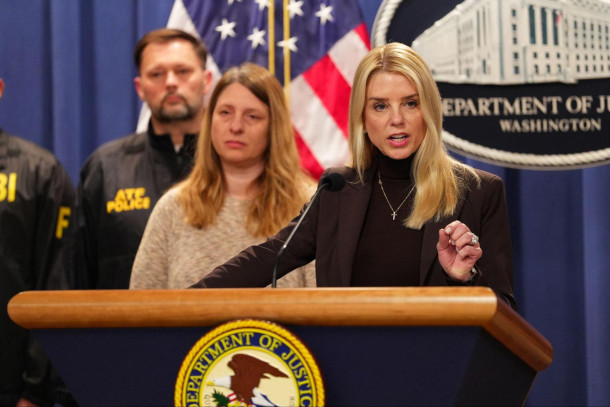
Attorney General Pamela Bondi referred to Vermont and New York’s climate superfund laws, as well as Hawai’i and Michigan’s climate lawsuits, as “burdensome and ideologically motivated.” (Photo: United States Department of Justice, Wikimedia Commons, Public Domain)
O'NEILL: So Pat, there are two different climate lawsuits here, one against New York and Vermont and one against Michigan and Hawai'i, right? Walk us through the highlights of these two cases.
PARENTEAU: Yeah, the claims or the arguments that the Trump administration is making are essentially the same in the cases that they brought to preempt Hawai'i and Michigan, and in the cases they've now brought to stop Vermont and New York from implementing their state laws. We call these Climate Superfund laws because they're based on the now famous remedy under the Superfund, the federal Superfund law, which means you can be liable for the pollution that your products are causing. Even if you didn't violate any laws, even if you're not at fault in any sort of legal way, you're simply liable because the result of you marketing and producing these products is it's causing damage and causing the states to incur costs to deal with the damage and to adapt to the effects of climate change. And so we call this a cost recovery action. And what the Trump administration is saying is that all of these state laws are preempted by federal law, constitutional law, they raise a whole slew of constitutional arguments. For example, they say the Clean Air Act preempts these cases. Which is kind of ironic, right, because Administrator Zeldin of the EPA has proposed to repeal basically all of the regulations under the Clean Air Act. He's proposed to repeal what's called the endangerment finding that was made back in 2009 and that's the finding that's required for the federal government to regulate greenhouse gas emissions under the Clean Air Act. So that argument that the Clean Air Act preempts state law is really cynical, right? Because they're also proposing to take away EPA's authority to regulate these sources. But there are other arguments they're making. They're saying it's interfering with foreign relations. That's pretty ironic, because we've just pulled out of the Paris Agreement. The United States won't even be present at the next Conference of the Parties, the COP meeting that's coming up in November. So we're not engaged at all in international negotiations, at least on climate. They're also arguing that it's interfering with interstate commerce. You know, the federal government has authority to regulate interstate commerce, and they're saying these lawsuits will make it more difficult to do that, and conflict with the federal government's preference for fossil fuel development. If it makes it more expensive to develop fossil fuels, their argument is, that's an interference with interstate commerce.
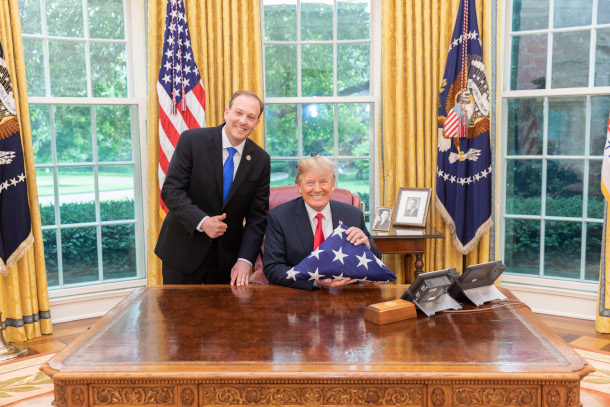
The Trump administration says one reason for pushing back against these state laws is because they are superseded by federal laws on climate change. At the same time though, Lee Zeldin (left), as head of the Environmental Protection Agency under President Trump (right), has made overtures towards ending the EPA’s endangerment finding, which is the foundation for the Clean Air Act’s ability to regulate climate-warming greenhouse gas emissions throughout the country. (Photo: Shaleah Craighead, Wikimedia Commons, Public Domain)
O'NEILL: Now Pat, for legal clarification here, Hawai'i and Michigan haven't even really moved forward with this litigation yet. How is it that the Trump administration can file a preemptive lawsuit for something that hasn't happened yet?
PARENTEAU: Well, no government has ever done that, and in fact, Hawai'i immediately filed their lawsuit the day after they were sued by the Department of Justice. Michigan has said they intend to file their lawsuit when they're ready, and they're not going to be intimidated by this preemptive strike from the Trump administration. I happen to think it's more of a political stunt, frankly, than a serious legal attack. I think what's going to happen is the Justice Department will amend the lawsuit they've already filed against Hawai'i to say, well, now we're just going to challenge the lawsuit that Hawai'i has brought based on their state law. And when Michigan files its lawsuit, they'll do the same thing. So in the end, the preemptive cases they filed against Hawai'i and Michigan will turn out to be the same kinds of cases the Trump administration has now filed against Vermont and New York. In the end, the states, all four of them, Hawai'i, Michigan, Vermont, New York, are all going to have to fight, not only with the federal government, but they're also going to have to fight with 24 states, red states, as we say, because all of those states have filed against New York and Vermont, and I'm sure that they will follow and sue Hawai'i and Michigan as well. And then in addition, you have lawsuits that have been filed by the Chamber of Commerce and the American Petroleum Institute against New York and Vermont. So you're going to have a three-ring circus of litigation against the states trying to collect damages from the oil companies. It's going to be the federal government, it's going to be these trade associations, and it's going to be the red state Attorneys General. So all of a sudden, the stakes in these cases have grown enormously.
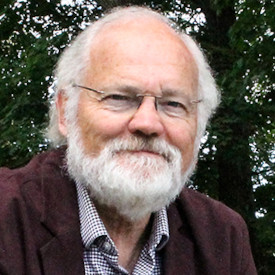
Pat Parenteau is an emeritus professor of law at Vermont Law and Graduate School. He is also a former EPA regional counsel. (Photo: Vermont Law and Graduate School)
O'NEILL: Well, Pat, so what happens next?
PARENTEAU: Right, so the first round of arguments is going to be over whether these challenges from these parties that I've mentioned against the states, are going to move forward to trial or to what we call summary judgment. And the states, I'm quite sure, are going to move to dismiss the Trump administration, dismiss the state Attorneys General, dismiss the Chamber of Commerce. The states are going to try to knock out these lawsuits that are challenging them. So that will be the first round of litigation. Are these cases going to proceed that are challenging the states, or are they going to get dismissed? If, as I think, they will get dismissed, it's not for sure, but let's say there's a good chance they'll get dismissed. Then you have to think about, okay, well, then they have to go up on appeal. And when you're talking about Vermont and New York, the appeal is to the Second Circuit US Court of Appeals in New York City. If you think about Michigan, that's the Sixth Circuit Court of Appeals in Cincinnati. And if you think about Hawai'i, that's the Ninth Circuit Court of Appeals in San Francisco. So all of a sudden now, you've got litigation moving up through the federal judicial process in different circuits, which is going to take quite a long time. In the meantime, the states of New York and Vermont are going to be sending a bill to the oil companies, Exxon and others, claiming that here's the amount of money we claim you owe us for the damage being done by climate change. Those cases will be in state court, so that's going to have to work their way up through state court proceedings and potentially eventually to the United States Supreme Court. So all roads seem to lead to the US Supreme Court for me, and it will be years before it gets there. That's why I say that these cases may outlive me. I hope not, but they could. They're going to take a very long time.
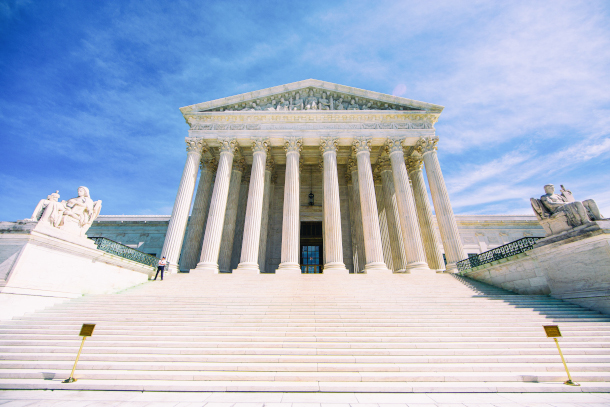
Pat Parenteau’s perspective is that these cases will eventually end up in the US Supreme Court, though with the common pace of litigation, it is likely to be a long time before they do. (Photo: Thomas Hawk, Flickr, CC BY NC 2.0)
O'NEILL: Pat Parenteau is an emeritus professor of law at Vermont Law and Graduate School. Pat, as always, thank you so much for taking the time with me today.
PARENTEAU: Thank you, Aynsley. Be well.
O’NEILL: We reached out to the Department of Justice for comment regarding these lawsuits, and they pointed us back to their press release. In it, Attorney General Pamela Bondi referred to the Climate Superfund laws and the lawsuits against the fossil fuel industry as “burdensome and ideologically motivated”. She also said they “threaten American energy independence and our country’s economic and national security.”
Related links:
- Reuters | “Trump Administration Sues Four Democratic-Led States to Block Climate Laws, Lawsuits”
- Listen to our previous interview about the New York Climate Change Superfund Law
- The Department of Justice’s Press Release
[MUSIC: Vision String Quartet, “Samba” on Spectrum, Parlophone Records Limited, a Warner Music Group Company]
DOERING: Just ahead, A new project from the cofounder of the All We Can Save climate leadership program aims to help people find their way through a world of climate chaos. Stay tuned to Living on Earth!
ANNOUNCER: Support for Living on Earth comes from Sailors for the Sea and Oceana. Helping boaters race clean, sail green and protect the seas they love. More information @sailorsforthesea.org.
[CUTAWAY MUSIC: Vision String Quartet, “Samba” on Spectrum, Parlophone Records Limited, a Warner Music Group Company]
Climate Wayfinding with Katharine Wilkinson
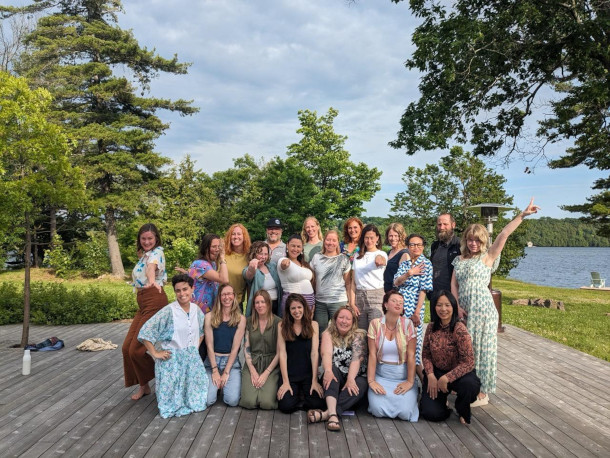
A climate wayfinding group gathers outside for a photo. As Wilkinson says, “It is no small thing to be human on Earth right now.” Climate Wayfinding seeks to provide a place to process that complexity, together. (Photo: Courtesy of Dr. Katharine Wilkinson)
O’NEILL: It’s Living on Earth, I’m Aynsley O’Neill.
DOERING: And I’m Jenni Doering.
Climate change is rooted in the hard, cold data of global temperature rise, ice loss from melting glaciers, and parts per million of carbon dioxide. But navigating a world in crisis takes more than just facts or even smart policies. At the end of the day, it’s people who decide how we should live on this changing planet, and what if anything should be done in the face of the climate crisis. And a new project called Climate Wayfinding aims to tend to the deepest needs of climate activists by providing a space for reflection, connection, and clarity amid the chaos. And it’s especially meant for the next generation of climate leaders who may be feeling discouraged by the current political climate. The Climate Wayfinding initiative is spreading across college campuses and has its roots in the All We Can Save project, co-founded by Dr. Katharine Wilkinson, who joins us now. Katharine, welcome back to Living on Earth!
WILKINSON: Jenni, it's so nice to get to be back here with you.
DOERING: You founded the All We Can Save project. Remind us about All We Can Save and what that was trying to do.
WILKINSON: So, in the dark days of 2020, Ayana Elizabeth Johnson and I co-edited a collection of writings by women climate leaders, essays, poetry, as well as some wonderful art. And that time, if you looked around and you were like, who's holding the microphones on climate discourse? Who's shaping how we think about this problem, how we think about what the solutions are, what's possible? So often, women were not the ones doing that. They were often doing it in extraordinary and overrepresented ways, within grassroots organizations and within protests and organizing of various kinds, but often they weren't the ones holding the mic. And my thought was that's just, a) not going to work, and it's not particularly fair. So let's see if we can do something that helps to move the needle towards a more representative shaping of our collective climate conversation. And that's really what the anthology was about, the sort of trends that I was witnessing and Ayana was also seeing in the climate space of these sort of gender disparities, there has been progress made on that. So it's still not equitable. We still know that most of the climate funding, for example, does not go to efforts led by women. It goes to efforts led by men. And I'm speaking in sort of gender binary terms, knowing, of course, that the world is more complex than that, but women are still underrepresented, for example, in the UN climate negotiations. And this, I think, is quite different than it was at the time when I felt such an urgency around this anthology project, and when we were moving the book towards publication, it was really clear that kind of the book wanted to be more than a book, and we've now had something like 2500 All We Can Save Circles that have happened across the US, across 30 countries, everywhere, from like high school eco clubs to C suite executives and kind of everything in between.
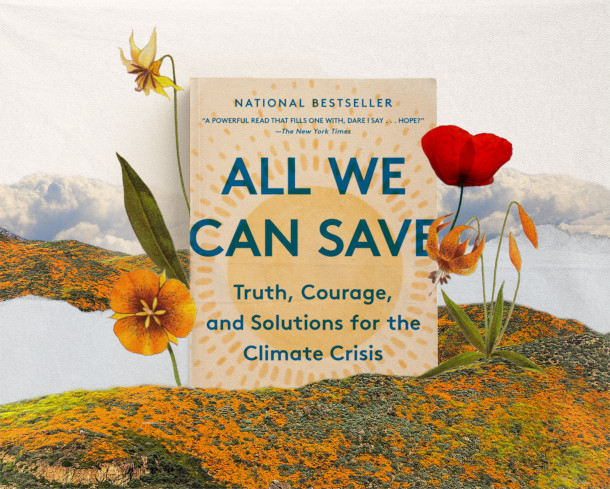
Published in 2020, All We Can Save is an anthology of essays, poetry, and art by women climate leaders, co-edited by Dr. Katharine Wilkinson and Dr. Ayana Elizabeth Johnson. The book has since inspired over 2,500 community circles across 30 countries. (Photo: Courtesy of Dr. Katharine Wilkinson)
DOERING: And they're not just book clubs, right?
WILKINSON: Right! They're not just book clubs. It's really about, how do we have a communal experience of deeper and more generous conversation about this topic than frankly, we find most of the time.
DOERING: There’s a project that grew out of All We Can Save called Climate Wayfinding. What's that about? I imagine it must be related to a lot of us feeling somewhat lost amid the climate chaos.
WILKINSON: I mean, we're living in a world where maps, quite literally, increasingly no longer work, right? And that's true as coastlines shift, as entire neighborhoods go up in flames, as storms wipe out farmland. You know, we're literally grappling with these very rapid shifts of the physical terrain. But I think this idea that our maps don't work is also true culturally and emotionally and internally, right? Our traditional ways of navigating human life are also coming up against some real challenges of this very liminal time. It is no small thing to be human on Earth, as there is so much that is being lost, there is so much that is being harmed, and there is still so much that is possible. And so how do we help one another, right, in this time where we're holding lots of big questions and we're facing lots of crossroads of different kinds, and how do we keep moving towards contribution and gain some clarity, some courage and a sense of connection to community along the way? So that's really what gave rise to Climate Wayfinding, a sense that we don't have enough spaces where we're able to bring those big questions and work with them in a generative way, right, where we look inward and look outward, so that we can then look forward. So Climate Wayfinding is a beautiful program. We did the first pilots of it almost three years ago, in the summer of 2022. And over the last year and a half, we've been beginning to scale that program across higher education. We now have 95 trained facilitators at about 80 colleges and universities across the US and Canada who are taking this program into the classroom, into J-terms, spring breaks, co curricular programs and really helping students find their way in this very tricky time. And think about what it does mean to shape their lives and their, you know, civic and professional trajectories within this context of our climate and ecological crisis.
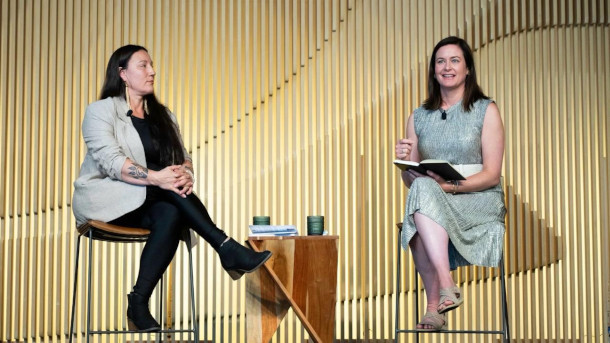
Dr. Katharine Wilkinson (right) and Indigenous rights activist Sherri Mitchell (left) in conversation. These moments of relational exchange are vital, Wilkinson says, to sustaining meaningful and transformative climate work. (Photo: Courtesy of Dr. Katharine Wilkinson)
DOERING: I’m curious, can you tell me about a time in your life when you kind of felt like you had lost your way, especially, you know, feeling lost in terms of climate. How did you find your way again?
WILKINSON: So, I think probably doing a PhD is a good recipe for losing your way.
DOERING: Oh, boy!
WILKINSON: Certainly, maybe at least for me, losing a little bit of a sense of my kind of vigor and spirit, but also, when I was finishing my PhD, it was in a particularly weird and hard moment in the climate space. So President Obama had been elected, it looked like we had the best chance in a generation for federal climate policy. It got through the house. It didn't get through the Senate. The international negotiations in Copenhagen kind of crumbled, fell apart, and I decided academia at that juncture was not the path for me. And I was really grappling with, where do I go, right? Where is there a foothold for generative action when clearly, so much was stalling at all of these different levels. And the zeitgeist at that time, this was 2009, 2010, the zeitgeist was kind of like, okay, if we can't make headway in these spaces, we've got to focus on cities and states and companies. And I had absolutely no experience in the world of business, but I ended up spending some years in consulting, and ultimately, for me, that was a really gutting chapter. I just basically felt like my little species was not in the right ecosystem. It was a lot about what and how, and not a lot about why, oftentimes. And I just felt so sad, frankly, and the way that I ultimately, sort of found my way out of that malaise, and really having kind of stepped back a bit from climate for a year or two, I went on a retreat with a group of quote, unquote, young leaders and activists that was facilitated by Parker Palmer, and that was a space for, I think, actually bringing all of the hard stuff that we were all grappling with, each in our own ways. And we did a Quaker process called a Clearness Committee, which leave it to Quakers to have had this very good way of helping people hold their big questions and their moments of not knowing in a way that's really supportive and generative. And I ended up kind of emerging from that retreat feeling like I had really tapped back into what I knew to be true and not what the world was telling me I should do or should try. And that ended up opening up kind of a whole new chapter. I ended up joining the team at Project Drawdown to do the bulk of writing that book Drawdown, and it brought me into, really, in a lot of ways, bringing together those threads I'd cared about for a long time. What is the story that we're telling? How do we invite more people into it? Using my own skills as kind of a words person, and I think that those moments, those kind of dark nights of the soul, even, if you will, we need each other, right? Those are really hard spaces to navigate solo and having kind of a sanctuary, and this sense of structured and supportive process was really important. And I think there are a lot of ways in which that experience, which was back in 2015 really has informed some of what we're doing with Climate Wayfinding. Because what I knew in my climate journey was that I was often going outside of the climate space to get that kind of help and support and grounding and renewal. And really we should be doing that from within the movement, from within the climate community itself.
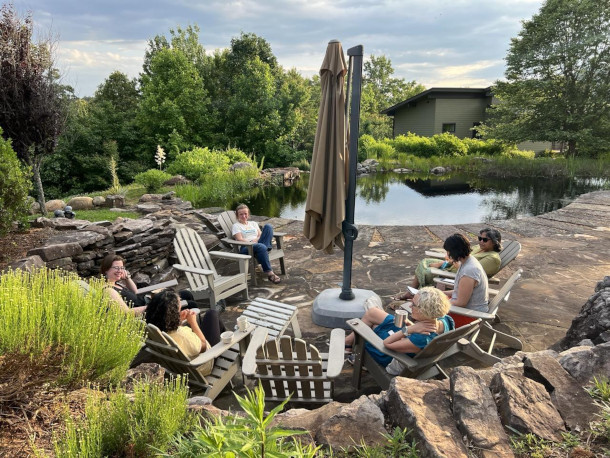
A group gathers outdoors for a Climate Wayfinding circle, reflecting a core value of the program: grounding oneself in the natural world to grapple with ecological loss and possibility. (Photo: Courtesy of Dr. Katharine Wilkinson)
DOERING: Kind of thinking back to the Clearness Committee, and then moving forward through the All We Can Save Circles and Climate Wayfinding. It seems like there's kind of a resonance there, like these spaces where people can come together and talk about these difficult issues and work through them in community.
WILKINSON: Yeah, I think from a kind of nitty gritty perspective, in a lot of ways, this is relational organizing, but it's also shoring us up to keep doing work that is frankly hard, even when we're making big strides, even when we have big wins. This problem is so massive, right? And we're chipping away at this over years and decades, you've got to have some real stamina for that. And to me, often, the thing that makes the work really good in the here and now is who we get to do it with, and finding a sense of community and camaraderie and joy in those relationships that form around the work that we're doing. And so more often than not, I think we see that when we don't do that work of kind of the inner work, the relational work, people burn out, right? They get fried. We step on each other when we don't intend to. We show up in ways that are antithetical to the future that we imagine because we're so stuck in the machinery of the here and now. I don't think it's just like, oh, this sort of feels good. It's nice to have. I think it is profoundly strategic if we want to get the policy wins that we dream of, move the technologies forward, get those market shifting movements of capital, shore up the resilience of our cities, like all of that hinges on people. People are making all of the rest of this possible or not. And I think sometimes we're not centering humans enough in what we're doing. And I'm not saying that in the sense of, like, human life matters, other life doesn't. No, I'm saying like, sort of the heart and soul and well-being of the people that are doing this really hard work, I think is important. I think we have to be a community and a movement that takes care of each other.
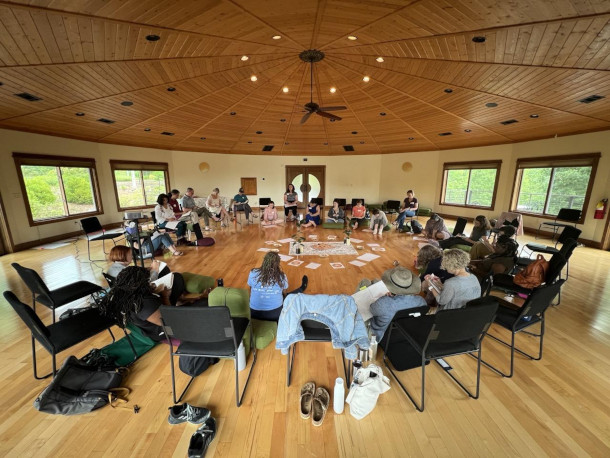
The Climate Wayfinding program offers in-person and online workshops, and has trained facilitators to host their own workshops, often on college campuses. (Photo: Courtesy of Cade Castle)
DOERING: There is so much these days that is overwhelming, even just tuning into the news, you know, how do you think that taking the approach of recentering on our values can help us in this moment in particular?
WILKINSON: Let's take a tree as a metaphor, right? This is like, not really the season for a lot of above ground action, at least at the federal level, but in a lot of ways, I think in a moment like this, it's time to do some of that mycelial work, right? Sort of the underground part of the work, so that when we have another more generative opening, we're ready for it, and we, our kind of root systems are stronger and more deeply intertwined, so that we can grow even stronger at that next opening time, if that makes sense. And I don't think that's a cop out, right? I think it's actually reading the context that we're in and understanding that there is often a cycle to these things, and this is a time to really grow the strength of the community, of the leadership, and, of course, to try to sort of push back and forestall those losses as much as we can.
DOERING: Do you have a message for people who feel like it's just all too much, I just want to tune out?
WILKINSON: I mean, I think the first thing I would say is I get it. One of the ways I keep my own root system strong and remember that it is actually a very cool thing to be alive in a body on this planet is that I have a horse that I am training, and it's just like my greatest source of joy, and in so many ways, has nothing to do with my work on climate, and in other ways, has everything to do with my work on climate. And I think part of the task of being alive is being awake, and that doesn't mean being awake to everything. I think there's a role for thinking about the resource of our attention and deploying it really thoughtfully. So not just like floating into, you know, the morass of every headline, every social media post. But like, where am I really going to bring this gift of my attention so that I can be effective in the spaces where I'm going to be effective? You know, the reality is that, well before our current political situation, like, we could only each do so much, and so, like, I think about this idea that that we're each kind of a node of possibility in this much bigger ecosystem. And to me, part of being a node of possibility is knowing like, what's yours to do and what is not yours to do, and trusting that there are all of these other nodes in the ecosystem that are also bringing their magic, right, and doing their thing. And so I think resisting some of that, like I don't want to look at any of it, I don't want to do any of it, and sort of saying, okay, what's the piece that I can can do with attention, with intention, and know that I am in some way contributing to this broader effort to bring healing to this planet.
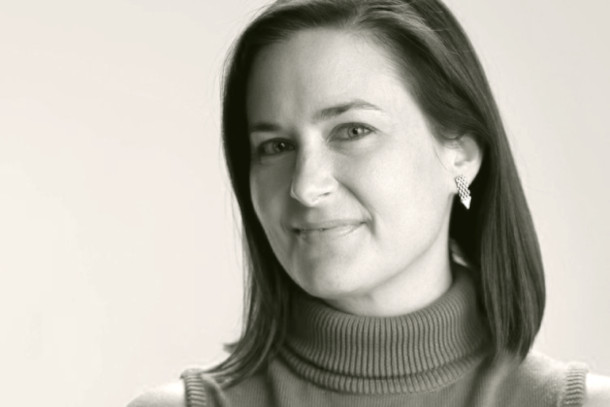
Dr. Katharine K. Wilkinson, co-founder of the All We Can Save Project and creator of Climate Wayfinding, has spent years amplifying underrepresented voices in the climate movement. In her work, she emphasizes the need for emotional resilience, community, and clarity in the face of ecological crisis. (Photo: Courtesy of Dr. Katharine Wilkinson)
DOERING: You know, thinking of each person as a node, as you were saying, maybe there's sort of a exponential positive impact that flows out into the world from the kind of work that you're doing.
WILKINSON: One of my greatest wishes, Jenni, is that that is so. Like we know this in our own lives, right? The things that are the most transformative for us personally are often things that are pretty intimate, right, that are pretty small scale. Whether that's a relationship or an experience, it's not a social post that gets 900,000 likes or whatever, right? Those are just not the things that create deep change. I think deep change is what is really called for in this moment. And I'm very into nature metaphors, apparently today, but as you were talking, I was imagining what it looks like when rain starts to fall on a lake or a pond, right? And you start to see the ripples running into other ripples and other ripples, and other ripples. I think that is what we're capable of doing together, of creating that kind of, sort of rippling, flowing change that is different than the kind of like linear, exponential, right, sorts of trajectories that somehow we've been taught are where power lies, and I'm just not sure that that's true.
DOERING: Katharine Wilkinson is co-founder and Executive Director of the All We Can Save Project and creator of Climate Wayfinding, and she's also co-host of the podcast A Matter of Degrees. Thank you so much, Katharine.
WILKINSON: Jenni, this was such a lovely, rich conversation. Thank you.
Related links:
- Discover All We Can Save, an inspiring collection of essays, poetry, and art from women leading the climate movement
- Explore Climate Wayfinding, a collaborative project helping people and organizations navigate climate uncertainty with courage and creativity
- Listen to A Matter of Degrees, an award-winning podcast that explores how we can move from climate despair to action—one degree at a time
[MUSIC: Vision String Quartet, “Willi’s Farewell” on Spectrum, Parlophone Records Limited, a Warner Music Group Company]
O’NEILL: Coming up, a faith group representing half a billion Christians calls for banks to stop financing fossil fuels. Keep listening to Living on Earth!
ANNOUNCER: Support for Living on Earth comes from Friends of Smeagull the Seagull and Smeagull’s Guide to Wildlife. It’s all about the wildlife right next door to you! That’s Smeagull, S - M - E - A - G - U - L - L, SmeagullGuide.org.
[CUTAWAY MUSIC: Vision String Quartet, “Willi’s Farewell” on Spectrum, Parlophone Records Limited, a Warner Music Group Company]
Faith in a Better Climate Future
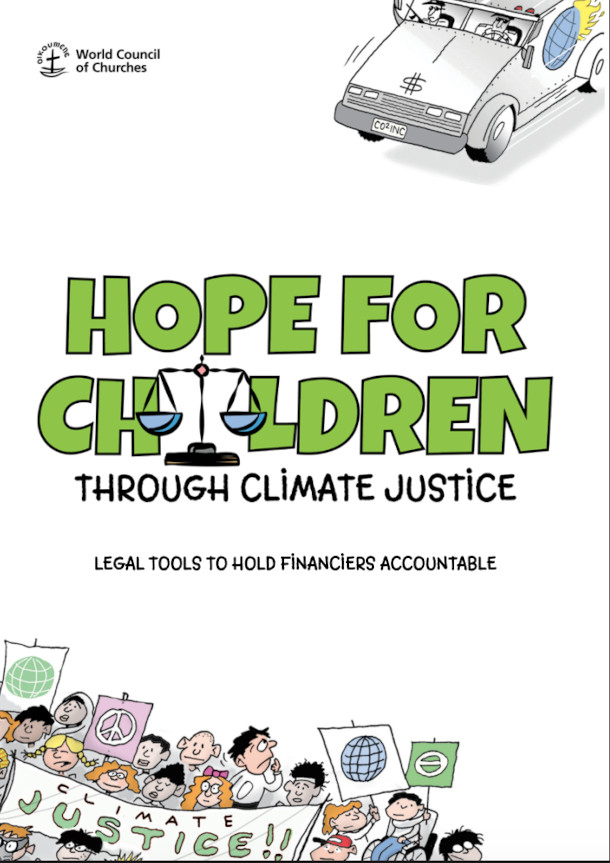
“Hope for Children Through Climate Justice” is a handbook written by the World Council of Churches. (Image: World Council of Churches)
O’NEILL: It’s Living on Earth, I’m Aynsley O’Neill.
DOERING: And I’m Jenni Doering.
Climate disruption poses an existential threat to the future of children around the world, with wildfires, floods, extreme heat and more putting lives in peril. The children of today and tomorrow are not to blame for this crisis, and yet, future generations are likely to suffer it the most. And for some people of faith, that is an unacceptable moral failing, and as such, they feel called to remedy this injustice. The World Council of Churches represents half a billion Christians and has published “Hope for Children Through Climate Justice,” a handbook for communities of faith looking to hold financial actors accountable for their fossil fuel investments. Frederique Seidel is the Senior Program Lead on Children and Climate at the World Council of Churches and she’s here with us now. Frederique, welcome to Living on Earth!
SEIDEL: Thank you very much. I'm very pleased to be here.
DOERING: So how would you describe this handbook, and why did you and your colleagues create it?
SEIDEL: This handbook is a source of hope for children. The main goal is really to save children's lives and to create perspectives for children to project themselves in a beautiful future. And right now, we tackle one of the most urgent matters for child protection, and that is the root causes of global warming. North and south, east and west, children everywhere have these fears when they see that there is massive funding invested into fossil fuel expansion, while science tells us that over 75% of greenhouse gas emissions are caused by fossil fuels. So yes, this handbook is there to help tackle this root cause and use, very simply, the laws which allow human beings to have their right to life respected. And we show in this handbook how in the different countries, people of faith can seize the very basic legal frameworks to defend the younger generation’s right to a livable future.
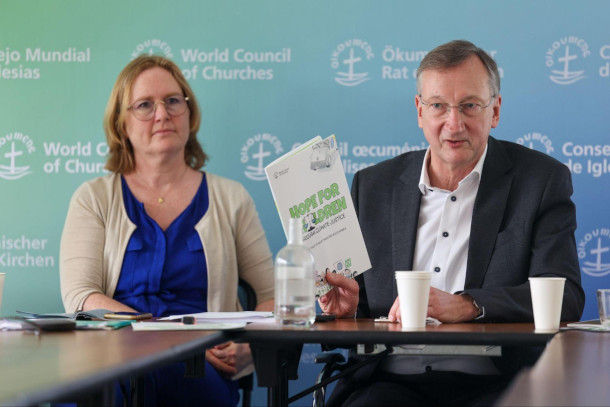
Frederique Seidel, World Council of Churches Senior Program Lead on Children and Climate (left) and Peter Prove, WCC Director for International Affairs (right), at the handbook launch in April 2025. (Photo: Ivars Kupcis/WCC)
DOERING: Now, the World Council of Churches includes many different Christian denominations, from Orthodox to Anglican, Baptist and Lutherans. How does its religious and ethical framework influence how it approaches climate justice?
SEIDEL: Yes, so the main reference for this work were science and the Bible. So we have crafted it together with leading scientists, with lawyers, but also with theologians who have helped us for every single chapter to anchor it in the gospel. So this is very important, as the mandate of the World Council of Churches is really to support its member churches in 120 countries representing over half a billion Christians. And as you said, their backgrounds and denominations are of a great variety. So we focus on the common denominator of all the churches, but also of all the religions, we work very much interfaith, and the most important common denominator is the right to life and to a healthy environment.
DOERING: So I think I hear you saying that even across many different countries, you know, where your member churches exist, there are shared human rights that are enshrined in the law, in the constitutions, and that using those basic rights as a basis for bringing legal action to challenge what's going on, that that can actually be a really powerful tool.
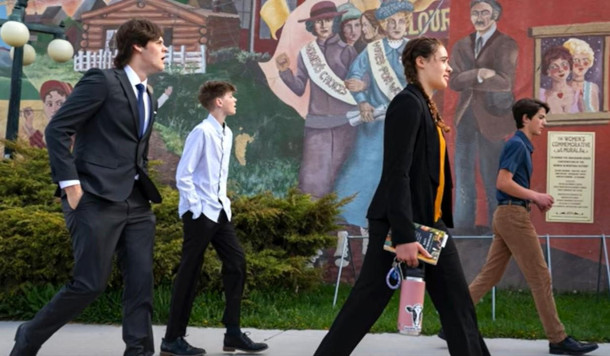
Frederique Seidel says that many of the plaintiffs in the Held v. Montana case felt their carefree childhoods were stolen by climate anxiety. (Photo: Our Children's Trust #youthvgov, Wikimedia Commons, CC BY 3.0)
SEIDEL: Exactly. There is, for example, the UN Convention on the Rights of the Child, and it has, since two years ago, a so-called General Comment 26 on Children and Climate, which is an authoritative guidance for governments on the rights of children when it comes to climate. So it is looking into that, but also into many international human rights frameworks which are not used enough to protect children. We also show in this handbook that there are many good examples of fossil fuel companies which have transitioned completely to renewables without dismissing any employees. This is a very important aspect, because this handbook is not against anyone. It is not even to target fossil fuel companies. It's just to show how to help them transition to renewable energies faster.
DOERING: And so what's the role for churches here, your member churches, what roles are they playing in this fight for climate justice?
SEIDEL: So this handbook is inspired by cases which were developed by churches, including in the US, but also in South Korea and Switzerland, in Sweden and in some African countries too. We have seen churches really at the forefront of legal action, because people of faith have a particular responsibility anchored in the Bible when they see something happening that is creating a lot of suffering. You may have heard of Dietrich Bonhoeffer, who has said that if you see someone driving into a crowd of innocent people, you cannot just watch and then pick up the dead and heal the wounded. You must actually take the steering wheel out of that driver's hands, and that is the goal of this handbook. So also to bring those who are currently driving into this wall of a future at huge risk, to make them change policies before it is too late. We also invite in this handbook people to observe if they may be victims of disinformation, as we don't want actually anyone to go to court. That's not the goal of the handbook. The goal is to make the policies change before the cases actually reach the courtroom.
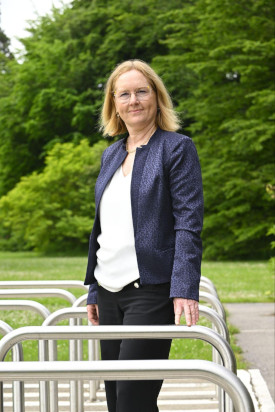
Frederique Seidel is the Senior Program Lead on children and climate at the World Council of Churches. (Photo: Alain Grosclaude)
DOERING: Well, wait a minute, explain that to me. I mean, it seems like you're trying to hold those responsible for the climate crisis accountable, including financial actors, but you're saying you don't actually want these cases to go to court.
SEIDEL: Exactly, because we have seen how, in many instances, by simply having a case being developed, many of the companies or financiers, they do not want to see headlines of them being targeted, especially not by moral leaders and institutions of faith. So we have a case in Australia, actually, a shareholder action case where yes, every single request was fulfilled before the case reached the courtroom. So that is the ideal scenario where people then realize that what they're doing is threatening lives, and that they even can make more money by investing into renewable energies.
DOERING: To be honest, I have to say, Frederique, that you know, picturing fossil fuel companies or picturing financial actors, in this case, as being so cooperative, the ones that are funding the fossil fuel industry, feels hard to picture, at least in the US at this moment. What gives you the faith that this is really a collaborative exercise, and not just, you know, parties at odds and having to take it to court?
SEIDEL: Well, what gives me a strong faith is just the experience from the past that many things seem unrealistic or impossible. I come myself from a German and French background, and my grandfather, who was a French war prisoner tortured by the Nazis, he said, in 1943, if someone would have told you, Germany and France will become best friends and create be the dynamic for the European Union, people, that would have just said, it's ridiculous, it's impossible. Another example is the Berlin Wall, you know, which separated Germany into two parts. Nobody at all would have ever believed that that wall would disappear, and that change was also driven by the churches. And so, yes, what needs to happen, according to science, is something which, right now, all the opposite is happening, but we have seen many amazing testimonials, even of leaders of big, big media companies, who have acknowledged that they really believed that climate change was just one theory and that it was not necessarily true. But then they understood the IPCC report, and they saw that this was real, and they regretted to have ignored global warming for so long. And many of these testimonials come after conversations with their children or grandchildren. So we see quite amazing transformation in people, and this handbook encourages for every leader in the world who is responsible for such investment choices to have a quick check up with their own conscience. And our goal is not to, as I said, sue anyone per se.
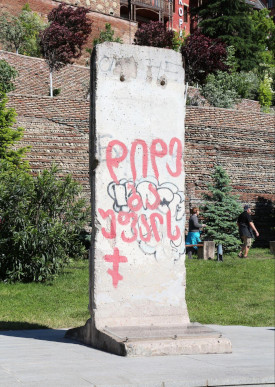
Segment of the Berlin Wall in Tbilisi, Georgia. (Photo: Bernard Gagnon, Wikimedia Commons, Public Domain)
DOERING: I understand that you work alongside children of different ages in having some of these tough climate conversations. Can you give us a little bit of insight into how they're feeling about the climate crisis and their hopes or concerns about the future?
SEIDEL: Yes, so most of the young people who have urged us to help in this area of work, they are suffering a lot. You may have seen the Montana case in the US, which was successful, which was a youth led climate litigation. When you see the images, they are all smiling about the success, but when you talk to the plaintiffs, they do explain how this has really spoiled their youth and their childhood, that they felt so stressed that there was no way to have any light heartedness anymore for playing football or dancing. Every single minute has to be invested in saving their future, and this project aims to take away a far too heavy burden from childrens’ shoulders. So we do focus on adults, we would like adults to take the lead, and for those children who already know and who understand the science, we welcome their collaboration, but when we would never go to a child or a teenager and make them collaborate. We believe that it's important for children to have this light heartedness and benefit from the right to play and that they can trust adults will take care of fixing what is threatening everyone's lives.
DOERING: It’s a very interesting distinction that you're making, to specifically say, we're doing this because of the children, but we want them to be able to have a childhood, and this isn't their responsibility.
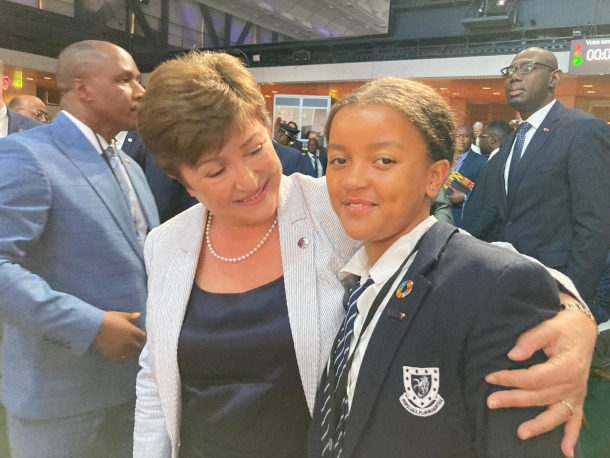
Kristalina Georgieva (left), managing director of the International Monetary Fund, stands with Ellyanne Wanjiku of Kenya (right), who prayed her way into a meeting of world leaders at the New Global Financing Pact in June 2023. (Photo: Courtesy of Frederique Seidel)
SEIDEL: Yes, and I also want to share an example from a 12-year-old girl, Ellyanne Wanjiku from Kenya who actually contacted me asking if I could help her and 10 other children from north and south to meet with Emmanuel Macron, the president of France. And I did think that was not a realistic request, but I agreed that we meet next to the new Global Financing Summit, where Macron was convening all the world leaders, and we then helped them craft a message for the world leaders. But this girl, Ellyanne Wanjiku, really enabled us to enter the main room where all the leaders were. So she looked into the eyes of every single security guard and prayed her way in. So suddenly we were standing there with, including the US leaders. And I think this is an example to show how children can also move mountains through their faith, and they have such a strong wish to have a livable future that they're ready to try so many things, and often they just are successful. So I think there were many leaders who were touched and moved by the fact that this girl from Kenya had made all her way to this place and had just really prayed her way into that room, and she was accepted. So that was quite an experience.
DOERING: Frederique Seidel is the Senior Program Lead on Children and Climate at the World Council of Churches. Thank you so much for taking the time with us today.
SEIDEL: Thank you very much. All the best to you.
Related link:
World Council of Churches “Hope for Children Through Climate Justice”
[MUSIC: Steven C, “Lift Up Your Hearts (Instrumental Version)” on Liturgical Instrumental Music, Vol. 2, Shamrock-n-Roll, Inc.]
"Depaving" the Way to Greener Neighborhoods
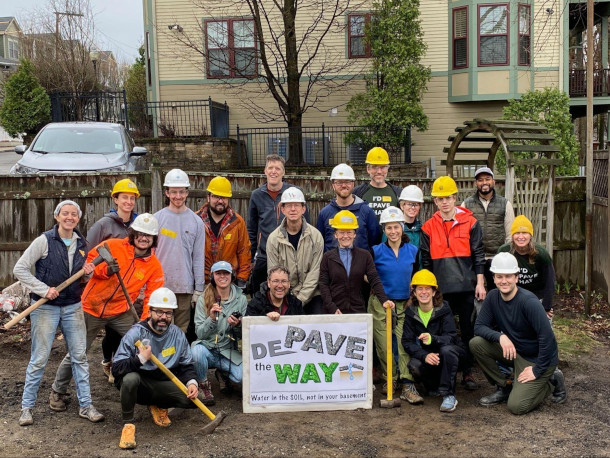
Green and Open Somerville’s “Depave the Way” initiative aims to help neighborhoods adapt to climate change and increase green space. From left: Leigh Meunier (black vest), Eduardo Rodriguez (orange), Jack Briskie (light gray) and Depave the Way participants. (Photo: Green and Open Somerville)
O’NEILL: In the warm weather months, a 90-degree day every so often can be a nice treat. But by 2070, the Massachusetts Bay Area will likely see almost 40 more of these days a year than it currently does. And too much of a good thing can definitely have its drawbacks. In the Boston area, the city of Somerville is particularly vulnerable. Over three quarters of Somerville is paved, and eighty two percent of the city is defined as a “hot spot,” or an area that has a heat index in the top 5% statewide. Stronger storms intensified by climate change are a threat there, too. Just a few decades from now, extreme storms in parts of Somerville could bring up to 10 feet of flooding. But there may be some relief in sight. Somerville residents are taking matters into their own hands. Living on Earth’s Sophia Pandelidis went to find out more.
[sfx dumpster and sledgehammer]
PANDELIDIS: It’s Sunday morning, and a rag tag group of neighbors has shown up to party.
[sfx sledgehammer]
PANDELIDIS: But not the way you might think. First off, they’re all wearing hard hats.
MEUNIER: And please make sure, if you're in this area, that you're wearing your equipment the whole time.
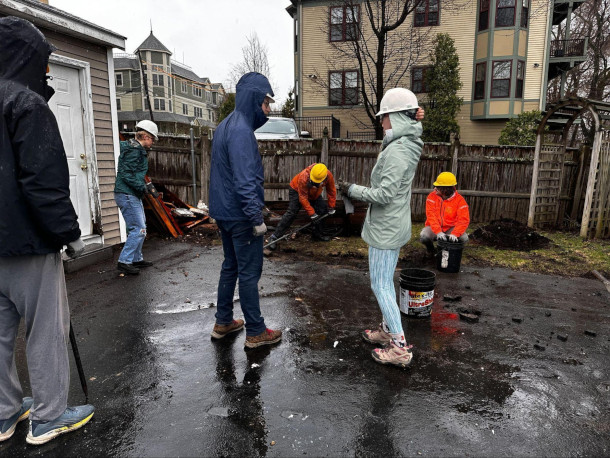
Living on Earth producer Sophia Pandelidis (second from right) gets the run-down of how depaving works. (Photo: Green and Open Somerville)
PANDELIDIS: This is a “depaving party.” About 20 volunteers are gathered in the fully paved backyard of a Somerville, Massachusetts home. And it’s their job to rip it up.
LIPSHULTZ: Swinging.
[sfx sledgehammer]
LIPSHULTZ: Wow, Oh my gosh.
PANDELIDIS: Armed with sledgehammers and wheelbarrows, the group works together to break up the asphalt and carry it to a dumpster in the driveway.
[sfx dumpster]
PANDELIDIS: The goal is to leave this yard pavement free. These “depaving parties” have been happening since 2010 and are now run by Green and Open Somerville. Leigh Meunier is one of the leaders of the group’s “Depave the Way” initiative. Her wide, bright eyes make you want to listen to her. She says there’s more than one reason to ditch asphalt.
MEUNIER: One of the things I really love about depaving is, is that it is multipurpose.
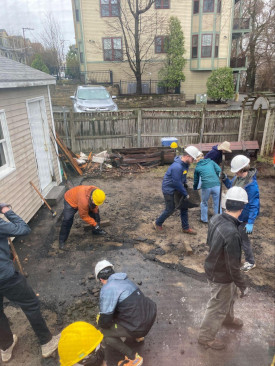
Armed with sledgehammers and wheelbarrows, volunteers work together to break up the asphalt and remove it. (Photo: Green and Open Somerville)
PANDELIDIS: First, it helps neighborhoods adapt to climate change. Depaving can prevent flooding by giving stormwater a place to soak into the ground and lower temperatures by reducing the urban heat island effect. That could save lives, especially in environmental justice communities that face higher heat risks. But climate resilience isn’t the only benefit to depaving.
MEUNIER: Ideally, when you can get pavement out, it increases not just more space for water to go, but it increases opportunities for planting gardens, for planting trees, for yards, for kids to run around and play, park space, etc. It's like, amazing.
PANDELIDIS: Yards filled with native plants instead of asphalt can also be havens for pollinators and local wildlife.
Jack Briskie, the host of today’s depaving, has plans for that.
BRISKIE: I've watched far too much Home Improvement TV on building bee houses, actually.
PANDELIDIS: But Leigh’s favorite part of depaving is how it brings the community together in an active way.
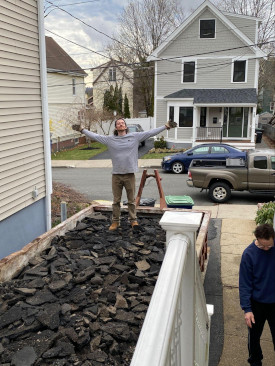
Host Jack Briskie stands in the dumpster full of asphalt. Renting a dumpster can cost up to $700. (Photo: Green and Open Somerville)
MEUNIER: I want to get sweaty. I want, I want my active energy, you know, to go towards something, and my creative energy to go towards something that's meaningful.
PANDELIDIS: One veteran depaver, Eduardo Rodriguez, is on a similar wavelength. He says there’s something cathartic about swinging that sledgehammer.
RODRIGUEZ: That first drop just releases so much rage. Yeah, we have a lot to rage about right now.
PANDELIDIS: The “depaving” movement is not new. It got its start in Portland, Oregon back in 2007, and has since spread across the United States and even Europe. Leigh says word is travelling fast here in Somerville.
MEUNIER: More people are biking, walking, taking transit, and have less need for cars. So we have all these long driveways that fit like five cars, and everybody's moving in and saying, I don't need that anymore, you know.
PANDELIDIS: This season’s depaving schedule is already filling up.
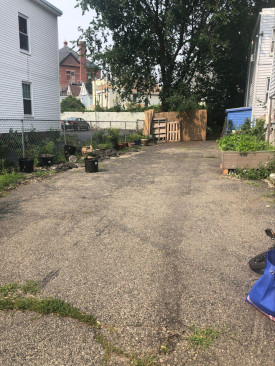
Another Somerville driveway before depaving. (Photo: Green and Open Somerville)
MUENIER: We're now on track to do at least seven this year, if not more.
PANDELIDIS: Everyone who wants to depave should be able to, Leigh says. But keeping up with growing demand is tough for her small team. And while volunteers are free, depaving still has a price too steep for some: up to $700 to rent a dumpster.
[sfx dumpster]
PANDELIDIS: So Green and Open Somerville is partnering with local NGOs to offset those costs for low-income, environmental justice neighborhoods. Leigh dreams of a time when she’ll get to lead these parties every weekend. For now, though, it’s time to sit back and admire the day’s work.
MEUNIER: Depaving, to me is, like, one of those things too, where you can, in three hours, see the fruits of your labor.
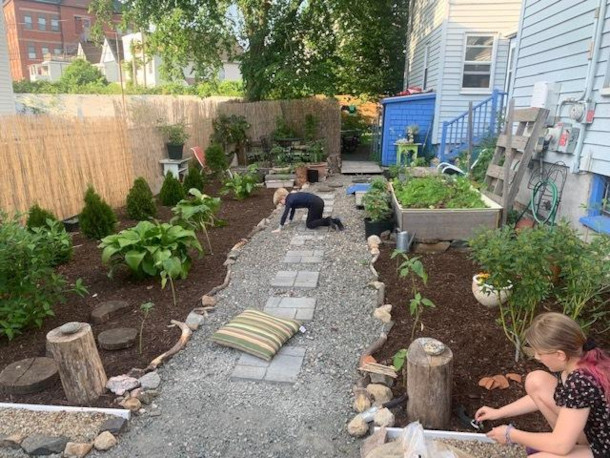
These residents decided to plant a garden where their driveway used to be. (Photo: Green and Open Somerville)
PANDELIDIS: She’s right. At the end of the party, it’s incredibly satisfying to watch as the last chunks of pavement are carried away and we’re left with…well, an actual yard, though it’s barren for now. So the group heads inside, muddy and tired, but proud. Their sandwiches will be well deserved. For Living on Earth, I’m Sophia Pandelidis in Somerville, Massachusetts.
[sfx sledge hammer]
Related link:
Green and Open Somerville: “Depave the Way”
[MUSIC: Average White Band, “Pick Up The Pieces” on AWB, Atlantic Recording Corporation]
O’NEILL: Want to hear more stories about people banding together in the name of nature? Tune in next time on Living on Earth for the story of how conservationists and birdwatchers boosted the numbers of a bird that nests in the sand.
SCHULTE: When I moved to Maine, there were no oyster catchers near me, and now there's a pair nesting just a few miles from my house along the beach or along the coast. And so I can go down there and I can see these oyster catchers that are here now because of the work of the of this group that I've been part of for the last couple of decades. They're susceptible to things like a storm coming and washing out the beach and washing their eggs away, but also like a human walking along the beach and stepping on their eggs, or simply just going and putting down your beach blanket and hanging out for an hour, 20 feet from an oyster catcher nest.
O’NEILL: The story of a hard-won conservation success, next time on Living on Earth.
[MUSIC: Average White Band, “Pick Up The Pieces” on AWB, Atlantic Recording Corporation]
DOERING: Living on Earth is produced by the World Media Foundation. Our crew includes Naomi Arenberg, Paloma Beltran, Daniela Faria, Mehek Gagneja, Swayam Gagneja, Mark Kausch, Mark Seth Lender, Don Lyman, Ashanti McLean, Nana Mohammed, Sophia Pandelidis, Frankie Pelletier, Jake Rego, Andrew Skerritt, Melba Torres, and El Wilson.
O’NEILL: Tom Tiger engineered our show. Alison Lirish Dean composed our themes. You can hear us anytime at L-O-E dot org, Apple Podcasts and YouTube Music, and like us please, on our Facebook page, Living on Earth. Find us on Instagram @livingon earthradio, and we always welcome your feedback at comments at loe.org. Steve Curwood is our Executive Producer. I’m Aynsley O’Neill.
DOERING: And I’m Jenni Doering. Thanks for listening!
ANNOUNCER: Funding for Living on Earth comes from you, our listeners, and from the University of Massachusetts, Boston, in association with its School for the Environment, developing the next generation of environmental leaders. And from the Grantham Foundation for the protection of the environment, supporting strategic communications and collaboration in solving the world’s most pressing environmental problems.
ANNOUNCER 2: PRX.
Living on Earth wants to hear from you!
Living on Earth
62 Calef Highway, Suite 212
Lee, NH 03861
Telephone: 617-287-4121
E-mail: comments@loe.org
Newsletter [Click here]
Donate to Living on Earth!
Living on Earth is an independent media program and relies entirely on contributions from listeners and institutions supporting public service. Please donate now to preserve an independent environmental voice.
NewsletterLiving on Earth offers a weekly delivery of the show's rundown to your mailbox. Sign up for our newsletter today!
 Sailors For The Sea: Be the change you want to sea.
Sailors For The Sea: Be the change you want to sea.
 The Grantham Foundation for the Protection of the Environment: Committed to protecting and improving the health of the global environment.
The Grantham Foundation for the Protection of the Environment: Committed to protecting and improving the health of the global environment.
 Contribute to Living on Earth and receive, as our gift to you, an archival print of one of Mark Seth Lender's extraordinary wildlife photographs. Follow the link to see Mark's current collection of photographs.
Contribute to Living on Earth and receive, as our gift to you, an archival print of one of Mark Seth Lender's extraordinary wildlife photographs. Follow the link to see Mark's current collection of photographs.
 Buy a signed copy of Mark Seth Lender's book Smeagull the Seagull & support Living on Earth
Buy a signed copy of Mark Seth Lender's book Smeagull the Seagull & support Living on Earth

